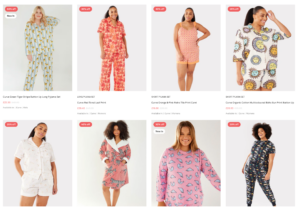New Digital Age has partnered with Entropy for the launch of Digital Commerce for the New Decade, an event featuring brands including GSK, Stella McCartney, Pernod Ricard and HSBC.
Ahead of the event, we talk to some of the brands speaking to hear how digital commerce is revolutionising the way brands connect with customers.
Alana Pozzebon, Global Media Manager and Joy Ashley Meijer (pictured), Ecommerce Merchandiser at Stella McCartney take us on a deep dive into some of the innovations they are using to transform the ecommerce experience.
What will you speak about at Digital Commerce For The Next Decade on April 2nd?
A: Insights on a Gen Z survey which highlights their perception of luxury fashion and how they are influenced by media & tech.
J: We are collaborating with Jay and Cat from DivInc, they have built an incredible company, conducting market research and collaborating with Gen Z. They have a huge reach of (200,000) Gen Z ‘consultants’ sharing their brutally honesty opinions. This should give us some valuable insights!
BOOK BY 6TH MARCH FOR EARLY BIRD TICKETS AT £100+VAT
How do you expect developments in digital commerce will affect your company over the coming years?
A: Advancements in technology will dramatically affect the way in which people shop online through things such as AR product try on and voice shopping. We will need to ensure our website is optimised for this new medium in order to increase online revenue.
The data management tools available (bridging the gap between online and offline) will enable us to cater to consumers with highly-personalised experiences, from advertising to website experience right through to post purchase cycle. This will increase brand loyalty and customer retention rates.
By the end of 2021, it is estimated that more than 70% of ecommerce sales will come from mobile. This means we will need to have our user journey on site fully mobile optimised.
Lastly, the rise in green consumerism will mean that we need to make information on our sustainability practices transparent on our website. Consumers are increasingly wanting to know more about the product they are purchasing. Where is it from? What material is it made of? Was this made ethically?
J: I completely agree with Alana but also think ‘affect’ isn’t the right word. Digital commerce is not something that just affects us but something we live in. Everything we do these days involves a digital aspect.
It’s about how businesses adapt to developments in tech and society and deliver a relevant product or service to their core customer. Collaborating on this Gen Z report is one of the ways we at Stella McCartney try to better understand our current and future customer to evolve with them and create products and experiences that are meaningful.
What do you think the biggest challenges are for the ecommerce sector and how can they be overcome?
They include connecting the online to offline experience and customer retention and loyalty
Ways in which brands can overcome these include maximising the potential of data-driven insights and connecting the dots across all departments i.e. marketing, creative, ecommerce, DOS stores, in order to make informed decisions. Digital transformation involves support from senior management, who need to have growth mindsets to drive success within digital innovation.
J: For smaller organisations or ecommerce teams within brands the challenge is where to invest? There is so much happening in the ecommerce landscape. Often budgets are limited, and senior management might not have a fully ‘digital mindset’. Brand need to keep referring to their core values and focus on their customers, data driven insights are key.
Have you seen any interesting digital commerce innovation recently that you’d like to share with readers?
Pinterest steps up e-commerce efforts with AR try-on. The feature allows users to try on lipsticks within the app then click out to buy.
Burberry launched a new AR shopping tool through Google Search technology. This lets consumers experience Burberry products embedded in the environment around them, bringing to life their research and shopping experience online.
Of course there has already been a lot of talk about blockchain technology in 2019 across different industries. I’m curious to see how this technology will continue to change/improve transparency in the fashion industry and how business will implement this.
How do you expect developments in machine learning and connected TV will affect digital commerce?
TV has traditionally been viewed as a medium to target mass audiences. Now, connected TV is unlocking the ability to deliver highly-personalised messaging to a range of different audience profiles and segments.
Domino’s already enables customers to order pizza through Xbox and Smart TVs. For the retail sector, soon someone will be watching their favourite show and have the opportunity to find out where the outfits are from and instantly shop them from the click of a remote.
With the explosive growth of online purchases, retail brands can now gather granular info including what audiences are most interested in by colour, size, fit, how long they spend on the website, how they rate and review products. Machine learning will mean that this data can be used to create a highly personalised experience online for each individual consumer.
The ability to target someone on such a personalised level will mean brands have a better understanding of their audiences and the consumer should feel more loyal to a brand. This said, brands will need to be transparent about the way they are using customer data in order to ease data privacy fears and earn trust.












